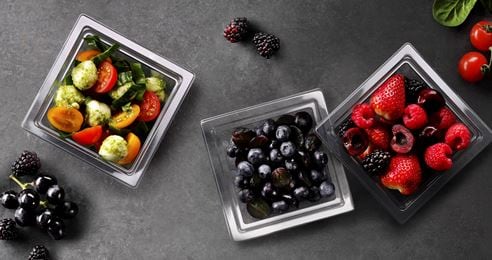The initiative is on the back of The European PET Bottle Platform (EPBP)’s campaign, which supports companies with their bottle design and innovation developments without disrupting the existing PET recycling industry.
More needs to be done
In the EU market, PET-based trays contain on average around 55% of recycled plastics but this is just the first step already achieved towards circularity.
“There is a growing trend in the collection of PET trays for specific recycling activities. But, more work must be done. Besides separate collection and proper sorting of trays and other PET sheet-based products, design for recycling is a major tool to boost their circularity,” said Sebastian Lemp, communications executive, Petcore Europe.
The guidelines have been developed by the PET Thermoforms Working Group, under Petcore Europe, and companies can contact the group for advice on how to improve the designs for recycling of their packaging.
Trays made out of PET sheet are ideal for applications such as fresh food and dairy (fresh and sliced meats, cheese, fresh pasta), providing great performances in transparency and improving the shelf life of products.
With these guidelines the PET industry wants to show that properly designed packaging, separate collection, good sorting and recycling of PET trays are the way towards circularity.
They reflect the current status-of-the art of technology; Petcore Europe will welcome any suggestion and will evaluate any new incoming technology in order to improve the document.
Every interested part can contact Petcore Europe to join this specific Working Group to cooperate towards an improved sustainability of PET-based trays.
Opaque and Difficult to Recycle
Petcore already launched a Working Group for Opaque and Difficult to Recycle (ODR) products in February last year, after the issue of heavily colored or opaque PET, which is in fast growing demand in new applications for milk bottles, detergents and family care products. Currently recyclers process mainly transparent or light colored PET.
The Working Group chairmen: Gian de Belder, circular economy & packaging sustainability, Procter & Gamble, and Herbert Snell, sales, MultiPet, will organize three meetings a year to discuss the issue as well as a public workshop.
The chairmen of the Working Group on Recycling PET Thermoforms is Wim Hoenderdaal Business Development Manager PET Recycling at Indorama Ventures Europe and Paolo Glerean, sales director, PET sheet dept. Aliplast and their last meeting was in May this year.
The EFSA Panel on Food Contact Materials, Enzymes and Processing Aids (CEP) recently announced it carried out a safety assessment of ‘RecyPET Hungária’, based on RecyPET Hungária technology, used to recycle post‐consumer PET into food contact materials, which it found to be unreliable. (EFSA Journal, November 30, 2018).
In the report it said: ‘The recycled plastic is intended for manufacture of bottles for soft drinks or water. The applicant provided a challenge test, but the flakes contaminated with the surrogates and the pellets obtained after extrusion and crystallisation were extracted with n‐hexane without showing sufficient recovery. The Panel considered the extraction as unreliable and could therefore not conclude on the efficiency of the decontamination process’.
It claimed the flow charts provided by the applicant did not enable a clear identification of the steps relevant for the decontamination efficiency, and no sufficiently clear overview of the operational parameters of the steps of the process and the challenge test was provided.
‘Without this information, a proper safety evaluation could not be performed. The Panel concluded that the process RecyPET Hungária is not sufficiently characterised and the applicant has not demonstrated in an adequately performed challenge test or by other appropriate evidence that the recycling process RecyPET Hungária is able to reduce contamination of the PET input to a concentration that does not pose a risk to human health’.
Title: Panel on Food Contact Materials, Enzymes and Processing Aids
DOI: 10.2903/j.efsa.2018.5481
Source: EFSA Journal 2018;16(11):5481
Question Number: EFSA-Q-2017-00092
On request from: National Food Chain Safety Office, Hungary

